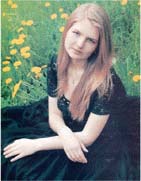|
One of principle indictments medieval Christianity
used to charge women for was that Eve (read "women") stood responsible
for the original sin and consequent human sufferings. The theme of Eve
as "misfortune causer" to humankind is among the most popular
ones in both European and Russian medieval literature; whenever an author
might want to draw a live example of wile female nature, Eva was always
at hand to help debase women either individually or in general. Well, what
is Eve’s guilt after all? She trespassed God’s instruction, yielded to
Serpent’s eloquence and, finally, lured Adam to do the same... Consequences
were terrible: falling apart from God’s glory; Eden lost forever; now we
are mortal and rotten, and sinful ... Getting back to Eve, why was she
found guilty in all these troubles? What were her inner reasons to out-pour
all these calamities onto our heads? The most widespread theory is that
Eve (a generic woman) was too weak (i. e. not strong, endurable, integral,
constant, etc. enough) to stand temptation by what Satan had to offer.
|
 |

![]()

